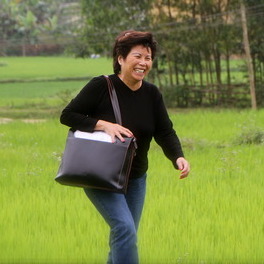A Quote by Dodie Smith
Perhaps watching someone you love suffer can teach you even more than suffering yourself can.
Related Quotes
At some point, we have each said through our tears, “I’m suffering for a love that’s not worth it.” We suffer because we feel we are giving more than we receive. We suffer because our love is going unrecognized. We suffer because we are unable to impose our own rules. But ultimately there is no good reason for our suffering, for in every love lies the seed of our growth.
To love is to suffer. To avoid suffering one must not love. But then one suffers from not loving. Therefore, to love is to suffer; not to love is to suffer; to suffer is to suffer. To be happy is to love. To be happy, then, is to suffer, but suffering makes one unhappy. Therefore, to be happy one must love or love to suffer or suffer from too much happiness.
I've been making a list of the things they don't teach you at school. They don't teach you how to love somebody. They don't teach you how to be famous. They don't teach you how to be rich or how to be poor. They don't teach you how to walk away from someone you don't love any longer. They don't teach you how to know what's going on in someone else's mind. They don't teach you what to say to someone who's dying. They don't teach you anything worth knowing.
For you see, the face of destiny or luck or god that gives us war also gives us other kinds of pain: the loss of health and youth; the loss of loved ones or of love; the fear that we will end our days alone. Some people suffer in peace the way others suffer in war. The special gift of that suffering, I have learned, is how to be strong while we are weak, how to be brave when we are afraid, how to be wise in the midst of confusion, and how to let go of that which we can no longer hold. In this way, anger can teach us forgiveness, hate can teach us love, and war can teach us peace.
I teach you joy, not sadness. I teach you playfulness, not seriousness. I teach you love and laughter, because to me there is nothing more sacred than love and laughter, and there is nothing more prayerful than playfulness. I don't teach you renunciation, as it has been taught down the ages. I teach you: Rejoice, rejoice, and rejoice again! Rejoicing should be the essential core of my sannyasins.
I love teaching I think more than anything. It's the opportunity to just teach young people and teach the game. You teach more than basketball. You teach life skills. The teaching part of it is something that I am passionate about. I look forward to every practice. A lot of people say well, I enjoy coaching, but I see myself as more as a teacher.
Love yourself. Just love yourself. In fact, the love of the self cures every kind of problem you have with yourself. For instance, if someone calls you nappy-headed, it rolls right off your body, if you love nappy hair. Or if someone calls you buck-toothed or too black, that won't be a problem if you love being buck-toothed or black. If you love it, then so what. The development of self-love cures many of the ills that people suffer from.
The best test to know whether an entity is real or fictional is the test of suffering. A nation cannot suffer, feel pain or fear, or has no consciousness. Even if it loses a war, the soldier suffers, the civilians suffer, but the nation cannot suffer. Similarly, a corporation cannot suffer, when it loses its value, it doesn't suffer. All these things, they're fictions. If people bear in mind this distinction, it could improve the way we treat one another and the other animals. It's not a good idea to cause suffering to real entities in the service of fictional stories.
When a man finds that it is his destiny to suffer, he will have to accept his suffering as his task. . . . He will have to acknowledge the fact that even in suffering he is unique and alone in the universe. No one can relieve him of his suffering or suffer in his place. His unique opportunity lies in the way in which he bears his burden.




































